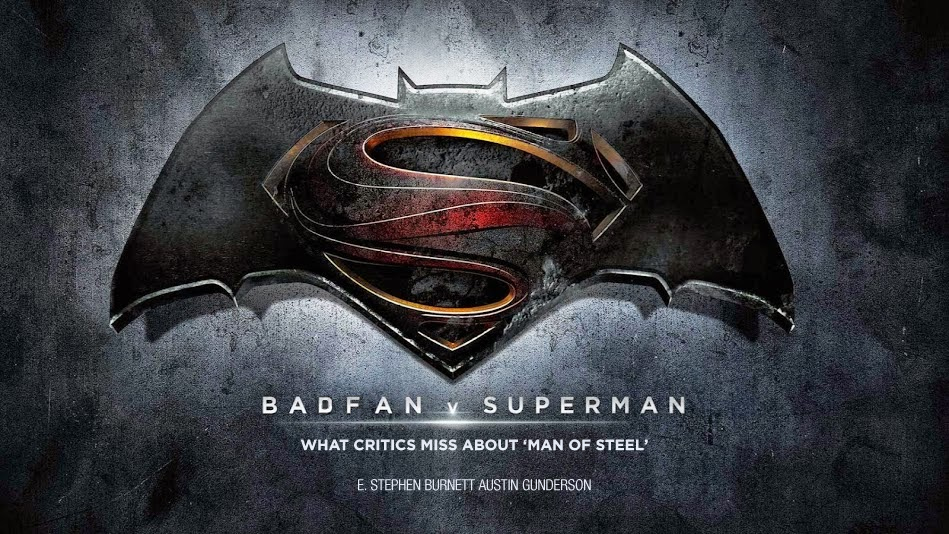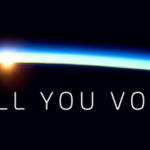Badfan v Superman 8: A Moral Cinematic Universe
SpecFaith staff explorers E. Stephen Burnett and Austin Gunderson share their month-long conversation about Man of Steel and how the film flies over many critics’ heads. See part 1, part 2, part 3, part 4, part 5, part 6, part 7, or read the the whole Badfan v Superman series.
E. Stephen Burnett: I am thrilled that, by all indications, Batman v Superman: Dawn of Justice is even attempting to tackle the issue of serious super-consequences.
Austin Gunderson: Thanks, Stephen, for this stimulating discussion. I think it’s an important one to have, and not just for genre fans.
When Alan Moore (author of such comics classics as “Watchmen,” “Batman: The Killing Joke,” and “V for Vendetta”) in 2014 referred to superheroes as “children’s characters” who enable “a retreat from the admittedly overwhelming complexities of modern existence” — a phenomenon he described as “potentially culturally catastrophic” — I think the pop-negativity surrounding Zack Snyder’s Superman is part and parcel of what he was addressing. For if our heroes inhabit a separate moral universe, how can their decisions possibly inform our lives?
While much of the backlash against the violence in Man of Steel purported to chastise the film for flippancy, I think what was really at issue for many people was the fact that it wasn’t sufficiently flippant to qualify as pure escapism. Of course, the film is escapist — no story whose hero leaps tall buildings in a single bound can really claim otherwise — but it’s an escapism with consequences in a universe of functional moral physics. When a genocidal superhuman tries to purge the planet, he cannot simply be insta-converted or banished or extinguished off-screen. He must be deliberately slain.

Many citizens died to bring us this GIF.
The Avengers manages to avoid this hard truth via the usual means: our heroes kill a bunch of faceless minions no one cares about, then merely exile the sympathetic villain. Easy-peasy. The metropolitan destruction they wreak in the process is forgiven them to the extent it’s treated as the result of a playful tussle. After all, it’s just a movie, guys, and look at Hulk punch Thor! See, it’s all in good fun. LOL!
But Man of Steel doesn’t break for comedic relief. It’s not interested in cushioning the blow of collapsing skyscrapers, or in using the imagery of destruction as an exciting backdrop for feel-good fun. When the towers fall in Metropolis, we’re reminded of September 11th, not Independence Day. And we don’t like that. This is supposed to be a superhero movie, dang it, not a serious movie! I came here to relax, not to grapple with the personal implications of Just War Theory!
Whether such an attitude is healthy for society as a whole, time will tell. I certainly don’t think it’s healthy for storytelling. If in our stories we aren’t willing to examine our own responses to evil by pairing consequences with actions, we’ll have created a dangerous rift between fiction and reality: the rift of fictional morals. A world in which evil just isn’t that serious a problem is a delusion, not a fantasy. And if it’s there that we live our imaginative lives, we’ll be left dangerously unprepared for real evil in the real world.
 It’s for this reason, Stephen, that I share your excitement for Batman v Superman. I anticipated great things even before I saw the recent extended trailer, but now that we know for certain that the fallout from Supes’ battle with Zod will be a major plot point, I’m ecstatic. A Superman who appears in court is a Superman prepared to confront the implications of “collateral damage,” vigilante justice, and public ingratitude. More than that, a Batman willing to actually take action on the premise that “absolute power corrupts absolutely” is a Batman who operates on principle, rather than the insipid pragmatism so common in superhero stories.
It’s for this reason, Stephen, that I share your excitement for Batman v Superman. I anticipated great things even before I saw the recent extended trailer, but now that we know for certain that the fallout from Supes’ battle with Zod will be a major plot point, I’m ecstatic. A Superman who appears in court is a Superman prepared to confront the implications of “collateral damage,” vigilante justice, and public ingratitude. More than that, a Batman willing to actually take action on the premise that “absolute power corrupts absolutely” is a Batman who operates on principle, rather than the insipid pragmatism so common in superhero stories.
I mean, let’s think this through. Superman, as an indestructible alien willing to take the law into his own hands, represents an existential threat to all human liberty. He cannot be controlled by anyone but himself. In embodying the spirit of security — “Superman will save us!” — he’s positioned himself as a potential tyrant without equal. Can a man of principle like Batman really afford to wait around to see whether Supes’ dictatorship will turn out to be benevolent? Especially when, at least in Bats’ mind, he’s already caused plenty of harm?
But many people, it seems, aren’t interested in such a conflict. “That’s dumb,” I often read. “They’re on the same side. Why can’t they just get along?” One might as well ask, “Who gave them permission to take leave of their fictional moral universe?”
In the real world, people don’t extend you trust just because you claim the symbol on your chest means “hope.” In the real world, we instinctively distrust those who wield unfettered power — whether they be generals or politicians or the ever-nebulous Rich, no matter what their stated purpose. In the real world, someone’s ability to watch over you doesn’t automatically elicit goodwill. If it did, everyone would love the NSA.
 So the reason many people dismiss the Batman-Superman showdown is ultimately the same reason people complained about Man of Steel: they prefer heroes who inhabit a separate moral universe. Batman should trust Superman “because he’s Superman, dagnabbit!” If we’re forced to watch Batman develop that trust, then we’ll have to grapple with whether we would trust Superman, too. Much easier for such dynamics to be offered up pre-cooked and pre-chewed — axiomatic assumptions that allow us to cut straight to consequence-free slugfests with villains we can all agree we’re supposed to hate. We want our heroes nonthreatening and our victories cheap.
So the reason many people dismiss the Batman-Superman showdown is ultimately the same reason people complained about Man of Steel: they prefer heroes who inhabit a separate moral universe. Batman should trust Superman “because he’s Superman, dagnabbit!” If we’re forced to watch Batman develop that trust, then we’ll have to grapple with whether we would trust Superman, too. Much easier for such dynamics to be offered up pre-cooked and pre-chewed — axiomatic assumptions that allow us to cut straight to consequence-free slugfests with villains we can all agree we’re supposed to hate. We want our heroes nonthreatening and our victories cheap.
It’s my hope and expectation that Batman v Superman will aspire to a weightier ideal. By examining the painful consequences of superhero-scale destruction, and by exploring the power dynamics introduced to Earth by the coming of the Last Son of Krypton, the film seems poised to transcend Alan Moore’s gloomy dismissal of the genre he spent his career enriching. Far from catering to childish sensibilities, it appears that DC has graduated to solid food.
Read the complete Badfan v. Superman series.









































Yesterday I had another pair of thoughts about the potential differences between both superhero cinematic universes …
Marvel is to Star Wars what DC could be to Star Trek.
E.g., Star Wars is set in a “lived in” universe of science fantasy, while Star Trek is set in a future universe that tries to explain things a little more and go a little deeper. Both are enjoyable story-worlds, yet with very different rules and emphases.
Or if you like, Marvel is to Windows what DC could be to Macs.
(No, I’m not a Mac Snob. Even if my laptop refuses to download Windows 10.)
Heh. If in your analogies Marvel represents fun-filled escapism as opposed to let’s-get-our-hands-dirty deconstruction, then Mac is probably its better match. People who use Macs — like me — don’t want to know what’s under the hood; we just want the dang thing to *work*.
With regard to Wars vs Trek, I suppose I can see that parallel, at least when it comes to tone. But keep in mind that the Star Wars universe, despite its EU, contains no cartoon endings. Qui-Gon, Maul, Dooku, Windu, Obi-Wan, Palpatine, and Vader all end up paying the ultimate price for their beliefs, whether to our cheers or groans of grief. While Star Wars may shoot from the hip with a cocky grin, its bullets don’t conveniently veer wide.
Eh, these names are strange to my ears.
Perhaps they are part of the “extended universe” of novels that I keep hearing about.
Sorry — yeah, I pulled those from the “Prequel Trilogy,” a much-derided fan-fiction. Let me refresh my list of the slain:
Owen & Beru, Greedo, Porkins, Tarkin, Jabba.
Um, spoiler alert. And if that warning applies to you … *waves hand* … you need to go home and rethink your life.
But while you’re re-thinking your life, no smoking. It’s harmful to your health!
(Sits back, satisfied) Wow. I really saved a life today. I really did the Force’s work.